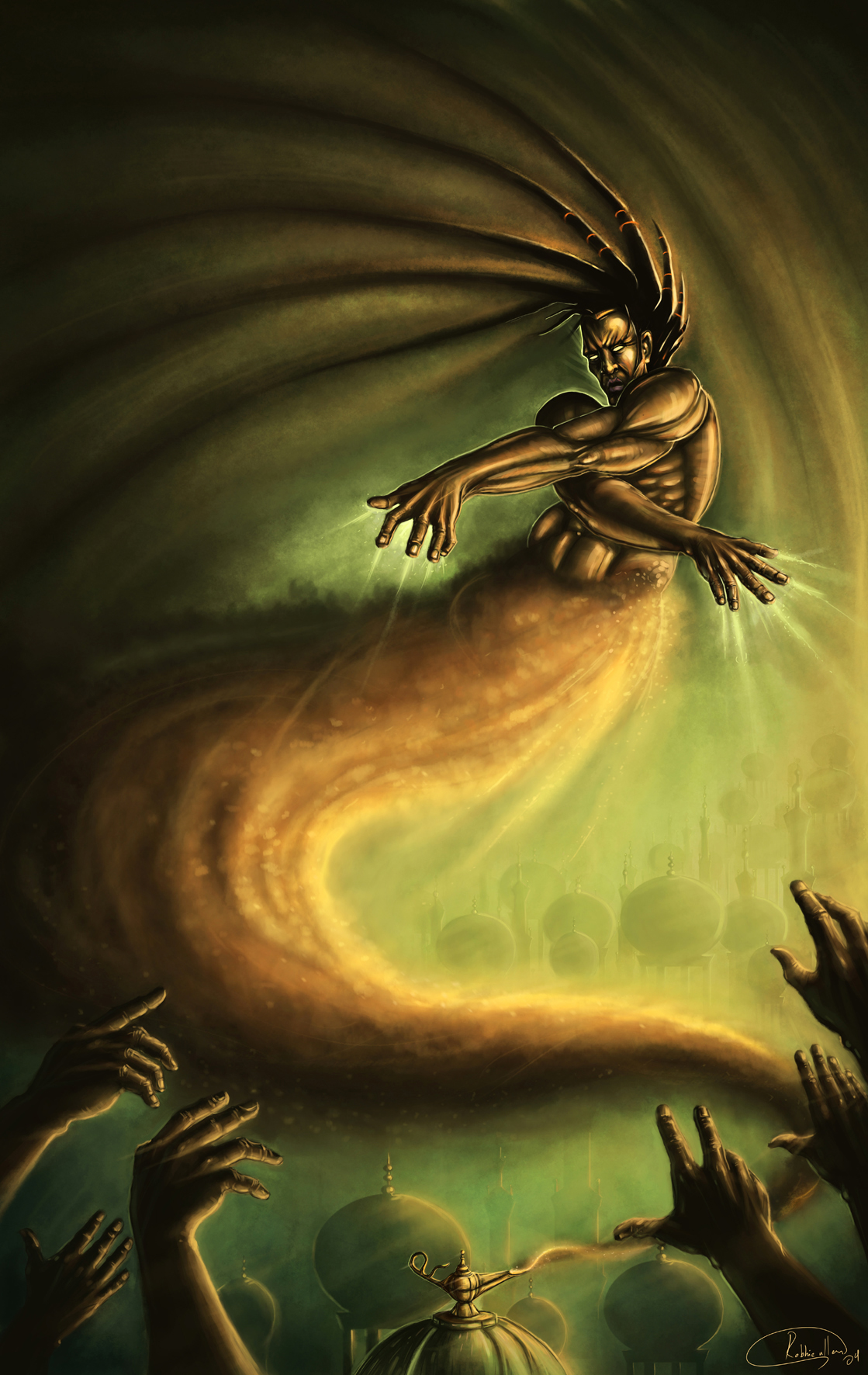|

|
In Arabic, a genie (also jinn, jinni, djinni,
from Arabic
جني jinnī) is a supernatural creature which occupies a parallel world to that of mankind,
and together with humans and angels makes
up the three sentient creations of God (Allah).
According to the Qur’ān, there are
two creations that have free will: humans and jinn. Religious sources don't
mention much about them; however, the Qur’an mentions that jinn are made of
smokeless flame, and they form communities just like humans, and, just like
humans, they can be good or evil.
The jinn are mentioned frequently in the Qur’an, and there is a surah entitled Sūrat al-Jinn. While Christian tradition
suggests that Lucifer was an angel
that rebelled against God's orders, Islam maintains that Iblīs was a jinni who was granted special
privilege to live amongst angels prior to his rebellion. After the rebellion, he was granted a respite to lead humans astray until the
Day of Judgment. However, Iblis has no power to mislead true believers in God.
Although some scholars have ruled that it is apostasy to disbelieve in one of God's creations, the
belief in jinn has fallen compared to the belief in angels in other Abrahamic
traditions Jinn is a word of the collective number in Arabic, derived from the
Arabic root j-n-n meaning 'to hide' or 'be hidden'. Other words derived
from this root are majnūn 'mad' (literally, 'one whose intellect is
hidden'), junūn 'madness', and janīn 'embryo, fetus' ('hidden
inside the womb').
The word genie derives from Latin genius, which meant a sort of tutelary
or guardian spirit thought to be assigned to each person at their birth. English
borrowed the French descendant of this word, génie; its earliest written
attestation in English, in 1655, is a plural spelled "genyes." The French
translators of The Book of One Thousand
and One Nights used génie as a translation of jinnī
because it was similar to the Arabic word in sound and in meaning. This use was
also adopted in English and has since become dominant.
The Arabic root j-n-n means 'to hide, conceal', as in the verb
janna "to hide, conceal". A word for garden or Paradise, جنّة jannah, is a cognate of the Hebrew word
גן gan 'garden', derived from the same Semitic root. In arid climates,
gardens have to be protected against desertification by walls; this is the same
concept as in the word paradise from pairi-daêza, an Avestan word for
garden that literally means 'having walls built around'. Thus the protection of
a garden behind walls implies its being hidden from the outside. Arabic lexicons
such as Edward
William Lane's Arabic-English Lexicon define jinn not only as
spirits, but also anything concealed through time, status, and even physical
darkness. In Arabic, the word
jinn is in the collective number, translated in English as
plural ("genies"); jinnī is in the singulative number, used to refer to one
individual, which is translated by the singular in English ("genie").
In other cultures also, such as in Guanche mythology from Tenerife in the Canary Islands, there existed the belief in
beings that are similar to genies, such as the maxios or dioses paredros ('attendant gods',
domestic and nature spirits) and tibicenas (evil genies), as well as the demon Guayota (aboriginal god of evil) that,
like the Arabic Iblis,
is sometimes identified with a genie. The Guanches were of Berber origin in northern
Africa, which further strengthens this hypothesis. |
 Copyright(c) 2007
- 2020. All rights reserved. Copyright(c) 2007
- 2020. All rights reserved.
|

![]() Copyright(c) 2007
- 2020. All rights reserved.
Copyright(c) 2007
- 2020. All rights reserved.